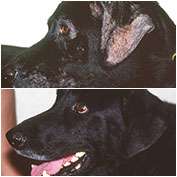Allergy care for pets in spring

Spring is one of the busiest times of year for veterinary dermatologist Dr Mandy Burrows at Murdoch University's Veterinary Hospital.
At the height of allergy season, her team see many new dog and cat patients every day. Many are suffering due to a variety of pollen allergies from weeds, trees or grass but Dr Burrows also treats pets for allergies to pet foods, dust mites and mould spores.
"Dogs and cats are just as susceptible as people to pollen allergies" she said.
"Over spring and early summer, pet owners should watch carefully for their dog foot-licking, face-rubbing and head-shaking as well as for rashes and irritation affecting the belly and causing the pet to scratch.
"Cats manifest allergies usually by over-grooming and excess hair coat loss."
Dr Burrows said that basic strategies to help the allergic pet were often easy to achieve.
"Some dogs and cats can improve if the diet is changed to avoid chicken and beef," she said.
"Regular bathing with low irritant shampoo products can assist some dogs in removing pollen from the hair coat, as well as supplementing both dogs and cats with omega 3 fatty acids, such as fish oil."
If symptoms persist, owners should take their pet to their local veterinarian. For severe allergies, specialist help was available.
At Murdoch University, allergy testing in the specialist dermatology clinic is available to determine whether a dog, cat or horse is allergic to pollen, mould or dust.
Allergy desensitisation using a course of injections administered once a month is a valuable strategy for pets with severe allergies, added Dr Burrows.
Desensitisation has the potential to improve symptoms as well as decrease the amount of medication a dog or cat may need to take for allergy control.
Provided by Murdoch University













